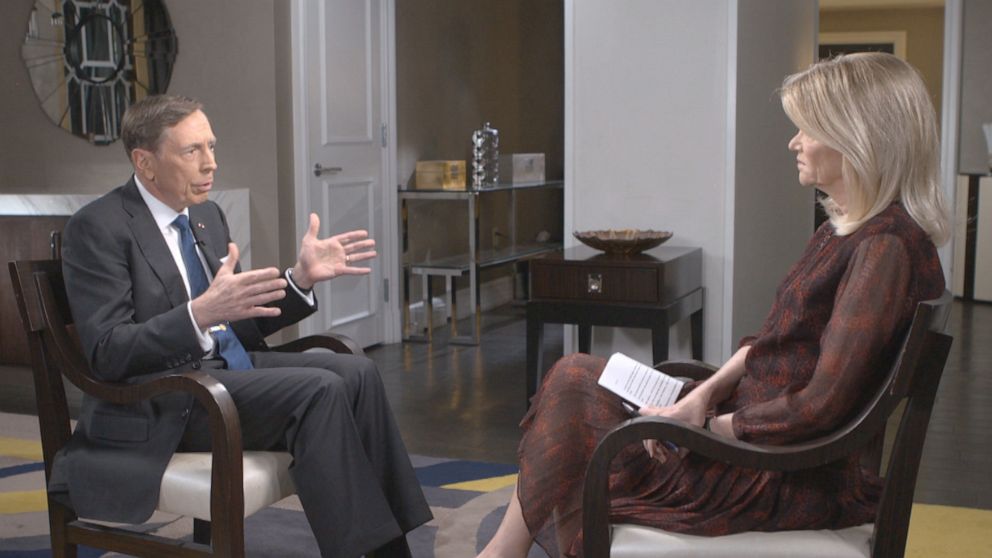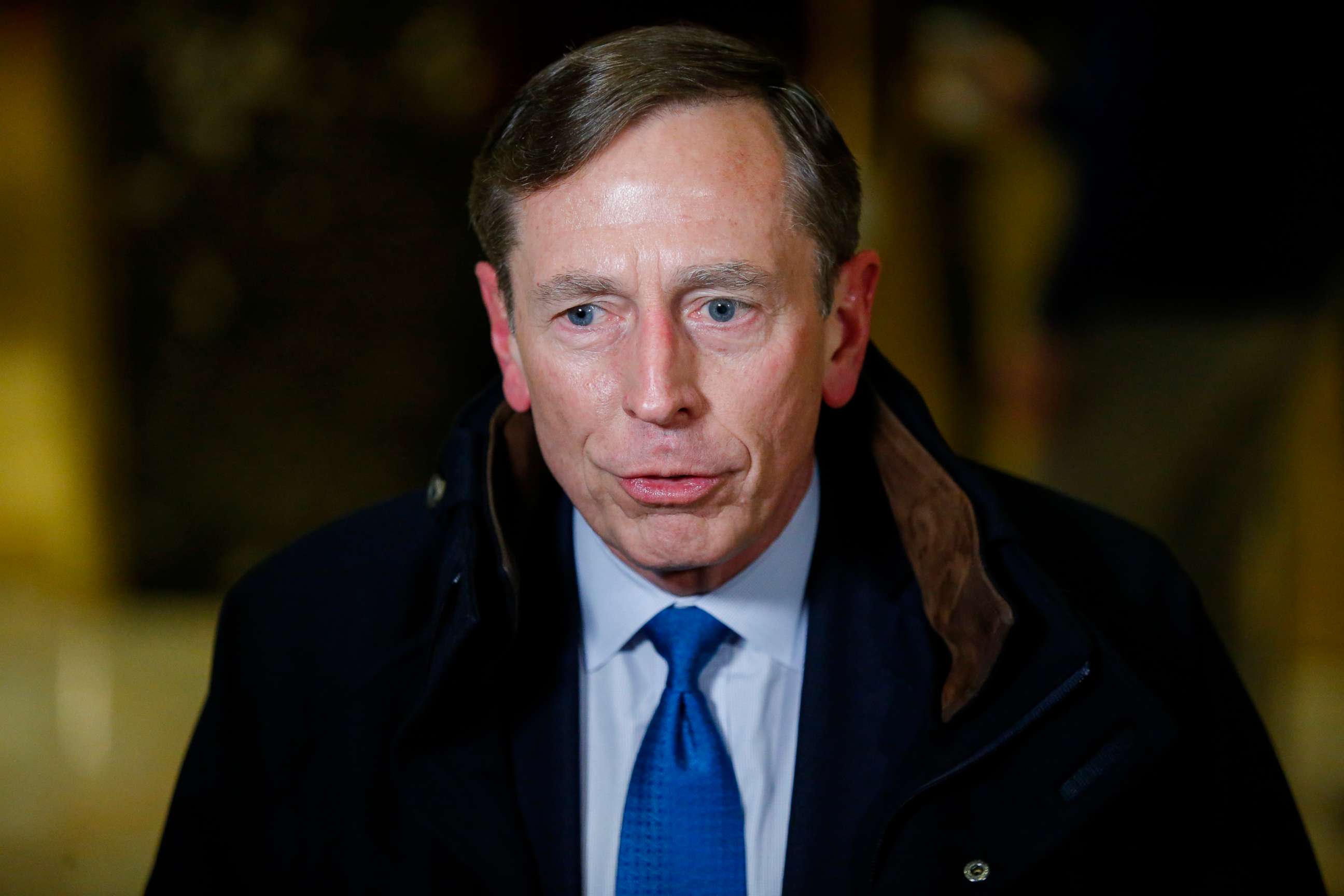President Trump 'doesn't want to go to war with Iran,' says Gen. David Petraeus
The retired four-star general said he doesn't see parallels with Iraq.
Gen. David Petraeus, the retired four-star general who led troops into battle during the 2003 U.S. invasion of Iraq, said he doesn't see parallels between the lead-up to that war and the current escalating tensions between the United States and Iran.
In an interview with ABC's "This Week" Co-Anchor Martha Raddatz, the former CIA director said he doesn't believe President Donald Trump wants to start another war in the Middle East.
"It’s pretty clear that [Trump] doesn't want to go to war with Iran. He’s not after regime change," he said in the interview, which aired Sunday morning.
Citing Secretary of State of Mike Pompeo, Petraeus added that the president's goals with Iran are more targeted.
"He's after what Secretary Pompeo has announced as the objective, which is regime behavior change," he said.
Raddatz noted that White House national security adviser John Bolton has previously advocated for regime change to end the Ayatollah's reign in the country.
"Do you think that's still being whispered in the president's ear?" she asked.
"Not after what the president said to the press the other day, certainly, if it was ever said," Petraeus said, noting that Bolton may be "a hard-liner," but on this issue, Trump "clearly is not."

At an event in the Roosevelt Room on May 9, Trump said he got "very good advice from" Bolton, but he was the one who makes the decisions in this White House.
"John is very good ... he has strong views on things, but that's OK. I actually temper John, which is pretty amazing, right?" the president said. "I have John Bolton and I have other people that are a little more dovish than him. And, ultimately, I make the decision."
Earlier this month, the United States deployed an aircraft carrier strike group and a bomber task force to the Middle East in response to "clear indications" Iran or its proxies were planning on attack on U.S. forces in the region, U.S. officials told ABC News. The Pentagon announced on May 10 it was sending a Patriot anti-missile battery to the area as well as further deterrence.
On Wednesday, the State Department ordered all non-emergency personnel at the U.S. embassy in Baghdad and the U.S. consulate in Erbil, Iraq, to leave.
Petraeus said that response was appropriate.
"This is both an effort to shore up deterrents, and also to shore up our defenses," he said in the interview.
Raddatz pressed on why this response was needed now, especially evacuating the embassy and consulate, when activity like this has happened before.
"I think this is a different situation. It's a different Iraq. It's not as hard as it was in those days," Petraeus said on "This Week."
The president has dismissed a New York Times story that reported the administration was reviewing a plan to send as many as 120,000 troops to the region if Iran attacked U.S. forces.
Even though Trump labeled the report "fake news," he also said that if that happened, he'd "send a hell of a lot more troops than that."
Petraeus said the president was "right in his assessment" that more troops would be needed. The White House denied the report, but Petraeus defended planning for such an attack.
"I think it's absolutely right that they should be examining a variety of different options. It’d be actually derelict if they did not actually prepare for whatever could come," he told Raddatz. "Iran is a country that has a population that is three times the size of Iraq when we invaded it, and a landmass that is three to four times the size of Iraq as well.
"And I think any thoughts about invading Iran -- again, rightly, the president has shelled those, I think -- that would be an enormous undertaking," he added. "And he's right in his assessment, we would need heck of a lot more troops than that, were we ever do something like that."

Lawmakers have been frustrated that the administration has not yet briefed them on the intelligence on the threat from Iran, with some questioning its validity. They compared it to the flawed intelligence asserting Iraq had weapons of mass destruction, which cleared the way for the United States to go to war in 2003.
"In Iraq there was a real momentum to go to war with Iraq, and there was intelligence, however flawed it turned out to be, that was generally assumed to be credible by the policymakers," Petraeus said. "There was an almost an article of faith that Iraq did have weapons of mass destruction of some kind and means to deliver them. I just don't see this at all similar to that."
The former chief commander of U.S. Central Command reminded Raddatz that he has "absolute enmity for" the Iranian regime, as it was responsible for hundreds of American soldiers' deaths "when I was privileged to command the surge." But he expressed hope for back-channel communications or meetings between the administration and Iran.
"President Trump has been quite clear about this. He would welcome communication, and apparently would be willing to sit down, himself," he said.
Still, when asked if it was wise to have a meeting with Iranian leaders, Petraeus added that "diplomatic preparation would be needed."
He said that with the recent activities, Iran may be trying to "stay below the threshold" that would prompt a military response.
"If exceeded, we would have to do something," he said in the interview. "And we would do something, presumably, more than they did to us."
"Do you think Iran will come to the negotiating table or cave in because of this maximum pressure campaign?" Raddatz asked.
"They are going to have to make a decision," he responded. "Can they try some kind of proxy activities? Can they make life difficult for us? They can, but they're going to be have to be very careful not to overplay their hand and result in some kind of response that is quite punitive.
"And I think this is where having President Trump in the White House, frankly, has to give them some degree of pause," he added. "Over the previous administration’s eight years, gradually they could get a sense of where the edges are and all the rest of this. I'm not quite so sure that with this White House, that there might not be a fairly substantial response to something that the Iranians might think is just a proxy activity that stays below what they think the threshold is, after which we would respond."




